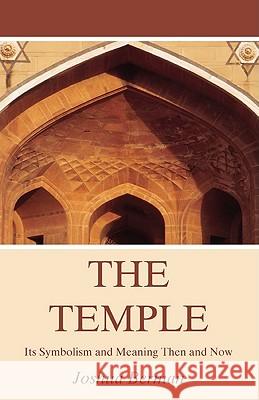The Temple » książka
The Temple
ISBN-13: 9781608997763 / Angielski / Miękka / 2010 / 276 str.
When thinking of the ancient Temple of Jerusalem, one often conjures up images of animal sacrifice, pilgrimages to the Holy City on religious festivals, and the High Priest solemnly entering the Holy of Holies on Yom Kippur. Indeed, each of these observances was a staple of Temple ritual, but it is easy to lose sight of the Temple as it impacted, and impacts, upon the daily life of Jews and their physical and spiritual responsibilities. Building the Temple is not merely one commandment of many; it cannot be examined in isolation. This volume shows how the Temple relates to the notions of Shabbat, the land of Israel, monarchy, Jewish independence and sovereignty, education, justice, covenant, Sinai, the garden of Eden, the Jewish relationship to the gentile world, and the very way the Jew relates to God. From a biblical viewpoint, the Temple is not only the central institution of the ideal Jewish society but also the central concept that binds and organizes all others. The minutiae of the Temple as portrayed in the liturgy and in the Bible often seem tedious and overritualistic. Classical sources of all genres abound to explain a particular passage or a particular rite. This book identifies broad themes that animate the meaning of the Temple, its rites, and the biblical passages that describe it. Details are probed as a larger conceptual whole. Animal sacrifice, particularly problematic to many on moral grounds, is examined in a new and revealing light. Many Torah commandments stand unchanged for all time regardless of historical events. Not so the commandment to erect the Temple. Social, economic, political, and religious currents were integral to the Temple's construction, destruction, and reconstruction. By probing these currents from the Bible's perspective, one can gain insight into the meaning of the times in which we live; we are in a process of rebuilding, even though we are far from redemption. ""Joshua Berman has performed a fine service to the Jewish imagination by this sustained meditation on one of Judaism's central symbols. No one will read this book without feeling that his understanding of Jewish spirituality has been enriched. It is a fascinating and thought-provoking analysis of a much neglected topic."" --Chief Rabbi Dr. Jonathan Sacks Joshua Berman is director of admissions and a lecturer in Bible at Nishmat--The Jerusalem Center for Advanced Jewish Study for Women. He holds a bachelor's degree in religion from Princeton University and received his ordination from the Israeli Chief Rabbinate following extended study at Yeshivat Har Etzion in Alon Shevut, Israel. His articles on biblical theology and on contemporary issues in Jewish life have appeared in the pages of Amit Woman, The Jerusalem Post, Judaism, L'Eylah, Megadim, Midstream, and Tradition. He has lectured widely on these topics in Israel, the United States, and Great Britain. Rabbi Berman, his wife, Michal, and their son now reside in Beit Shemesh, Israel.
When thinking of the ancient Temple of Jerusalem, one often conjures up images of animal sacrifice, pilgrimages to the Holy City on religious festivals, and the High Priest solemnly entering the Holy of Holies on Yom Kippur. Indeed, each of these observances was a staple of Temple ritual, but it is easy to lose sight of the Temple as it impacted, and impacts, upon the daily life of Jews and their physical and spiritual responsibilities.Building the Temple is not merely one commandment of many; it cannot be examined in isolation. This volume shows how the Temple relates to the notions of Shabbat, the land of Israel, monarchy, Jewish independence and sovereignty, education, justice, covenant, Sinai, the garden of Eden, the Jewish relationship to the gentile world, and the very way the Jew relates to God. From a biblical viewpoint, the Temple is not only the central institution of the ideal Jewish society but also the central concept that binds and organizes all others.The minutiae of the Temple as portrayed in the liturgy and in the Bible often seem tedious and overritualistic. Classical sources of all genres abound to explain a particular passage or a particular rite. This book identifies broad themes that animate the meaning of the Temple, its rites, and the biblical passages that describe it. Details are probed as a larger conceptual whole. Animal sacrifice, particularly problematic to many on moral grounds, is examined in a new and revealing light.Many Torah commandments stand unchanged for all time regardless of historical events. Not so the commandment to erect the Temple. Social, economic, political, and religious currents were integral to the Temples construction, destruction, and reconstruction. By probing these currents from the Bibles perspective, one can gain insight into the meaning of the times in which we live; we are in a process of rebuilding, even though we are far from redemption.""Joshua Berman has performed a fine service to the Jewish imagination by this sustained meditation on one of Judaisms central symbols. No one will read this book without feeling that his understanding of Jewish spirituality has been enriched. It is a fascinating and thought-provoking analysis of a much neglected topic.""--Chief Rabbi Dr. Jonathan SacksJoshua Berman is director of admissions and a lecturer in Bible at Nishmat--The Jerusalem Center for Advanced Jewish Study for Women. He holds a bachelors degree in religion from Princeton University and received his ordination from the Israeli Chief Rabbinate following extended study at Yeshivat Har Etzion in Alon Shevut, Israel. His articles on biblical theology and on contemporary issues in Jewish life have appeared in the pages of Amit Woman, The Jerusalem Post, Judaism, LEylah, Megadim, Midstream, and Tradition. He has lectured widely on these topics in Israel, the United States, and Great Britain. Rabbi Berman, his wife, Michal, and their son now reside in Beit Shemesh, Israel.











